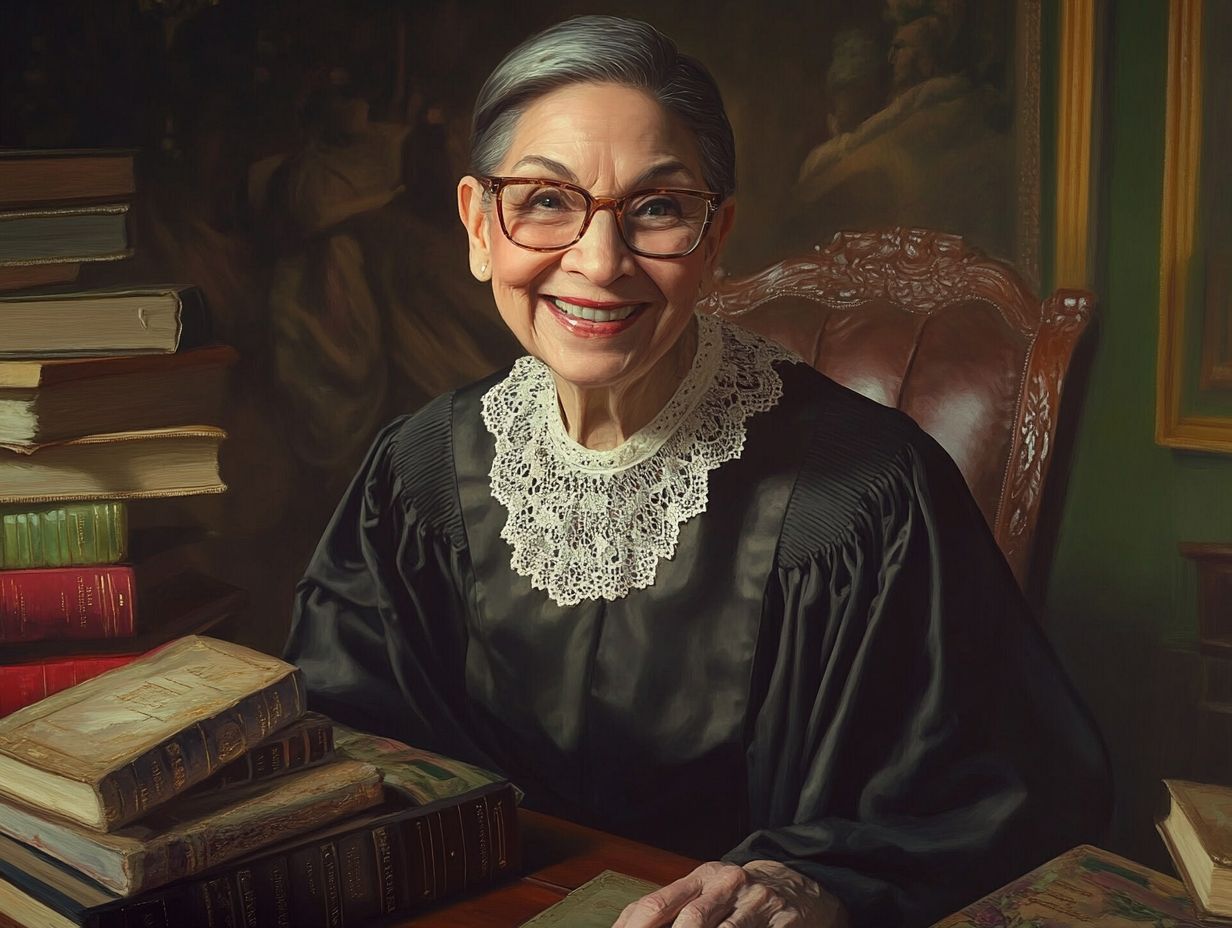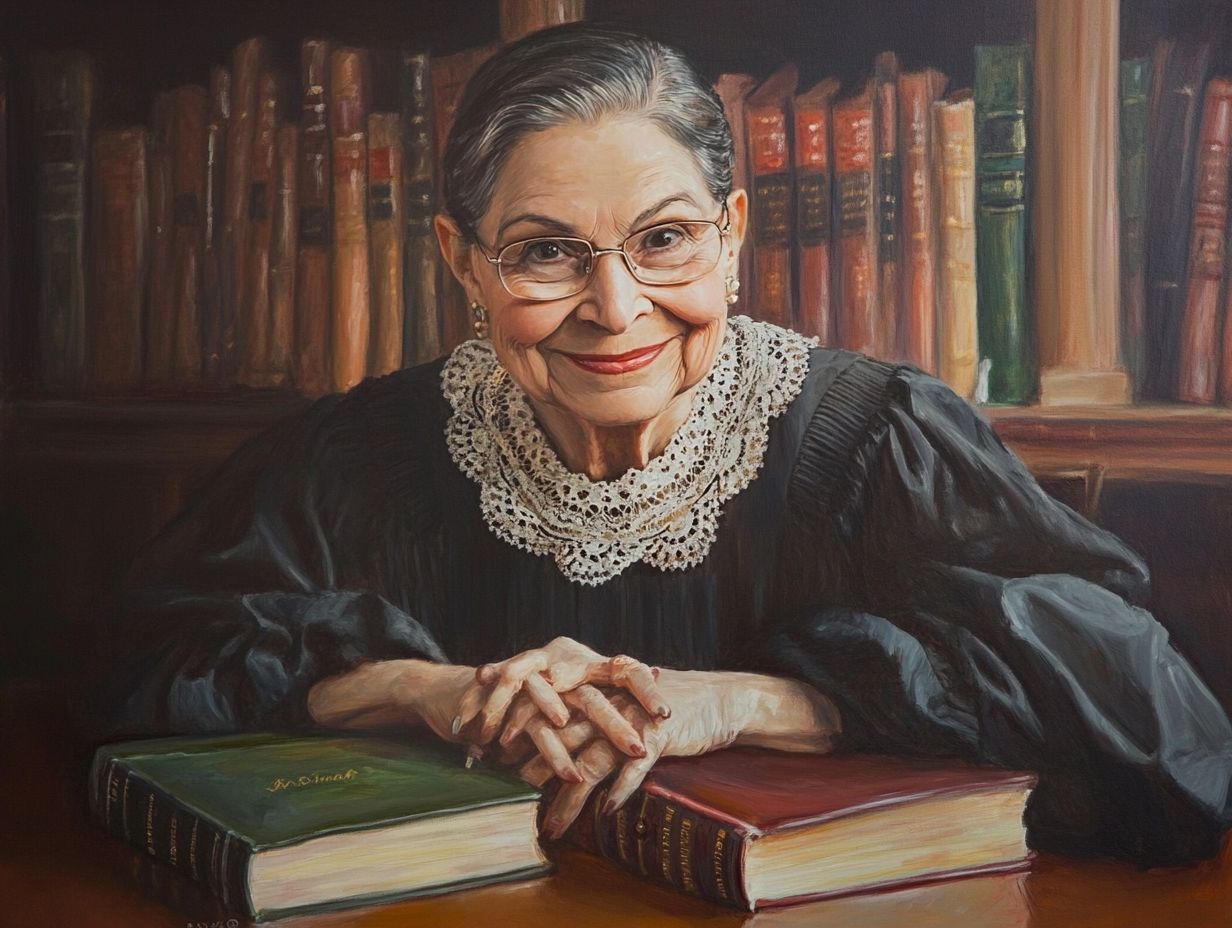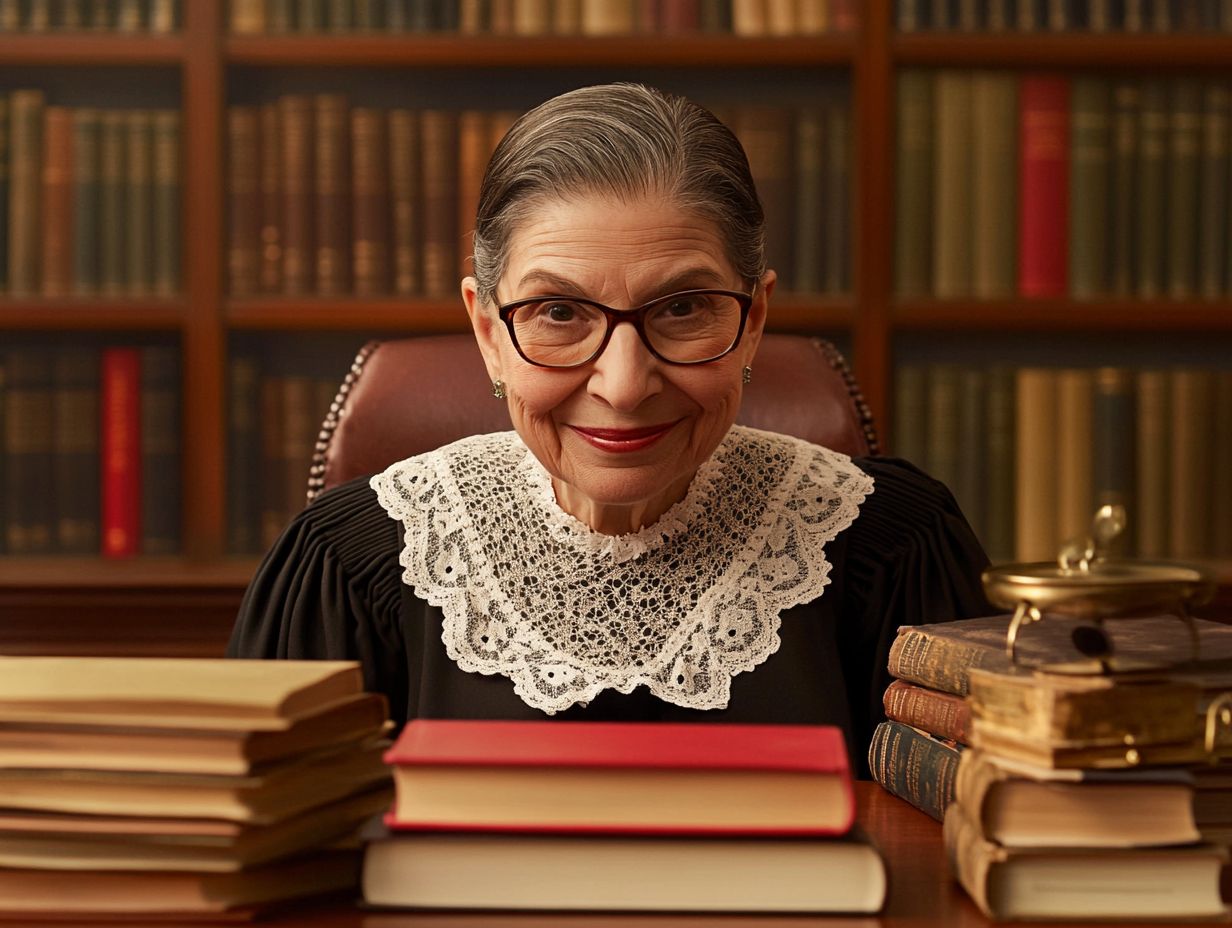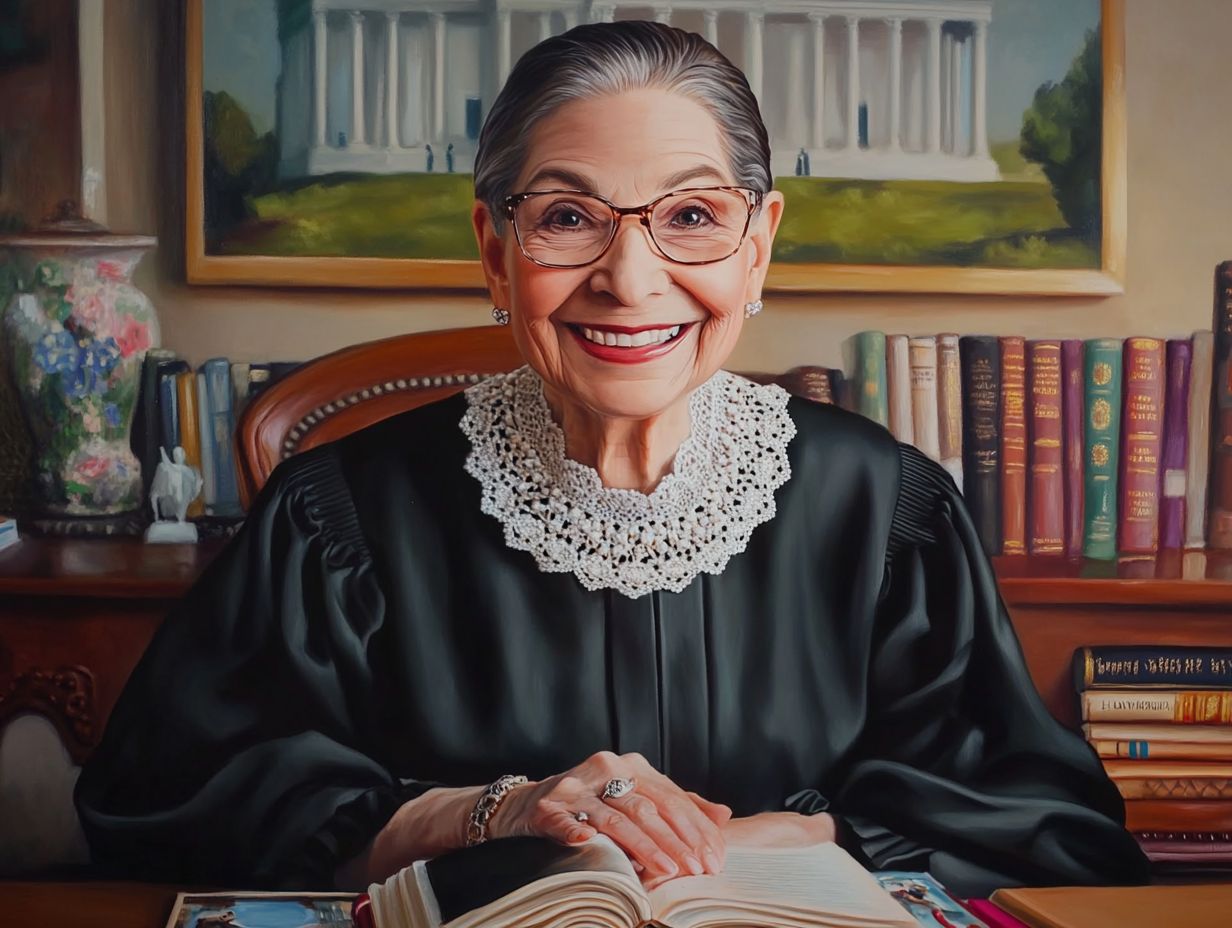The Inspiring Life of Ruth Bader Ginsburg
Ruth Bader Ginsburg’s remarkable journey from humble beginnings to a commanding presence in the legal realm is nothing short of inspiring.
With profound family influences and an unwavering commitment to education, she meticulously crafted the foundation for a groundbreaking career.
Her relentless advocacy for women’s rights and her influential tenure on the Supreme Court transformed the legal landscape, leaving an indelible mark.
Dive into the achievements and enduring legacy of this trailblazing figure, whose influence continues to inspire generations to come.
Contents
- Key Takeaways:
- Early Life and Education
- Legal Career and Activism
- Supreme Court Nomination and Tenure
- Legacy and Impact
- Frequently Asked Questions
- Who is Ruth Bader Ginsburg?
- What was Ruth Bader Ginsburg’s early life like?
- How did Ruth Bader Ginsburg become a Supreme Court Justice?
- What were some of Ruth Bader Ginsburg’s notable accomplishments as a Supreme Court Justice?
- What impact did Ruth Bader Ginsburg have on the legal field?
- How did Ruth Bader Ginsburg’s personal life play a role in her career?
Key Takeaways:

- Ruth Bader Ginsburg’s early life and education shaped her into a fierce advocate for justice and equality.
- Her groundbreaking legal career and activism paved the way for gender equality and women’s rights.
- As a Supreme Court Justice, she left a lasting legacy and continues to inspire future generations and impact the legal system.
Early Life and Education
Ruth Bader Ginsburg, a towering figure in American jurisprudence, embarked on her remarkable journey in Brooklyn, New York.
Her early life was profoundly influenced by her family background and the societal challenges of her era, particularly concerning gender discrimination and women’s rights.
Born into a Jewish family, she faced personal challenges that ignited her resilience. This spirit pushed her to study at Cornell University and then Harvard Law School, laying the groundwork for her illustrious legal career.
Childhood and Family Background
Ruth Bader Ginsburg’s childhood was profoundly shaped by her family’s values and the rich cultural landscape of Brooklyn, where she was born and raised.
Her parents, especially her mother, instilled in her the vital importance of education and perseverance qualities deeply rooted in their Jewish tradition.
Growing up in a close-knit community, she witnessed the struggles of women, particularly those from immigrant families, as they fought to assert their rights and carve out their rightful place in society.
These formative experiences sparked her early awareness of gender inequality and ignited a lifelong commitment to social justice.
The vibrant tapestry of Brooklyn’s diverse neighborhoods offered her a plethora of perspectives, reinforcing the belief that every voice counts in the relentless pursuit of equality and justice.
Education and Early Career
You might find it fascinating that Ruth Bader Ginsburg embarked on her legal education at Cornell University before making her way to Harvard Law School.
There, she faced notable gender discrimination as one of the few women in her class. Yet, despite these obstacles, she thrived academically, ultimately becoming the first female member of the Harvard Law Review.
Her journey was marked by unwavering perseverance as she navigated a predominantly male legal landscape, skillfully dismantling stereotypes and biases along the way.
Upon transferring to Columbia Law School, she earned her degree while simultaneously building a formidable reputation in legal advocacy.
Her tenure with the American Civil Liberties Union (ACLU), an organization that defends individual rights, cemented her commitment to advancing women’s rights, as she strategically litigated cases that challenged discriminatory laws.
These defining experiences laid the foundation for her crucial role in shaping legal discourse around equality and justice.
Legal Career and Activism
Ruth Bader Ginsburg’s legal career is a shining example of her fierce commitment to women’s rights and gender equality.
She emerged as a trailblazer in the legal profession, particularly through her groundbreaking advocacy work with the American Civil Liberties Union (ACLU) Women s Rights Project.
Her influence in this arena has left an indelible mark, inspiring countless individuals to champion the cause of justice and equality.
It’s crucial that we remember her legacy today, as the fight for gender equality continues.
Join the movement and learn more about how you can get involved in advocating for women’s rights and equality!
Notable Cases and Achievements

Ruth Bader Ginsburg championed landmark cases that reshaped civil and women’s rights. Notable examples include Ledbetter v. Goodyear and Reed v. Reed.
These cases were pivotal for establishing significant legal precedents that underscored the principles of equality and justice within American society. In Ledbetter v. Goodyear, Ginsburg highlighted pay disparities that women frequently encounter. She advocated for fair wages and emphasized that discrimination can never be tolerated.
In Reed v. Reed, she took a stand against gender discrimination in estate administration. She powerfully asserted that the law must treat all individuals equally, regardless of gender. Her tireless fight reshaped the future, creating a powerful legacy in legal reforms that inspires future generations to pursue gender equality and social justice.
Advocacy for Women’s Rights
Ruth Bader Ginsburg’s unwavering advocacy for women’s rights established her as a feminist icon and a crucial figure in the equality movement. She became a leading voice for fair treatment and gender equality within the legal profession.
Throughout her illustrious career, she fought relentlessly against fairness issues affecting many people. Her work with the American Civil Liberties Union and her role as a co-founder of the Women s Rights Project showcased her dedication to dismantling legal barriers that fueled gender inequality.
Ginsburg s strategic prowess in the courtroom not only advanced women’s rights but also inspired a new generation of female lawyers to seek equality across all aspects of life. By championing causes that upheld the dignity of women, her legacy continues to empower those advocating for justice, positioning her as a beacon of hope in the ongoing struggle for civil rights.
Supreme Court Nomination and Tenure
Ruth Bader Ginsburg’s nomination to the United States Supreme Court by President Barack Obama stands as a historic milestone. She became the second woman to serve on the Court.
During her tenure, she left an indelible mark through her active role in law and progressive values. This further solidified her legacy in American history.
Confirmation and Early Years on the Court
Ruth Bader Ginsburg endured a rigorous confirmation process before taking her seat on the United States Supreme Court. She swiftly made her mark with several landmark decisions.
Her journey to confirmation was filled with scrutiny and debate. This reflected society’s changing expectations around gender equality and civil rights. Once on the bench, she confronted numerous challenges as she navigated a predominantly male Court. She consistently championed causes that aligned with her unwavering commitment to equal treatment under the law.
Notable early cases, such as United States v. Virginia, showcased her legal expertise and dedication to advancing women’s rights. These cases set a powerful precedent for future rulings. Ginsburg’s intellectual rigor and resilience transformed interpretations of the law and established her legacy as a formidable advocate for justice and equality.
Landmark Decisions and Dissents
During her tenure, Ruth Bader Ginsburg authored several landmark decisions and dissenting opinions. These highlighted her progressive values and unwavering commitment to combating gender discrimination.
Her influence is most evident in cases like *United States v. Virginia*, where she challenged the male-only admission policy at the Virginia Military Institute. She underscored the importance of equal opportunities for women across all domains. Ginsburg s nuanced reasoning highlighted the systemic barriers faced by marginalized groups.
Her powerful dissents in cases such as *Burwell v. Hobby Lobby* emphasized the repercussions of corporate exemptions on women’s health rights. These pivotal moments reshaped legal precedents and inspired generations to champion gender equality and social justice, solidifying her legacy as profound and far-reaching.
Legacy and Impact

Ruth Bader Ginsburg’s legacy resonates deeply with countless others. She embodies resilience and the pursuit of women’s leadership and equality in all facets of life.
Inspiring Future Generations
Ruth Bader Ginsburg shines brightly as a symbol of hope, giving power to countless women attorneys and advocates for gender equality. Her example encourages you to break barriers and pursue justice with unwavering determination.
Her groundbreaking contributions on the U.S. Supreme Court and steadfast commitment to civil rights have left a lasting impact on the legal landscape. Ginsburg’s efforts in advancing women’s rights through important cases like Reed v. Reed and United States v. Virginia not only reshaped societal norms but also instilled a profound sense of purpose in the next generation of legal leaders.
Today, young women look to her legacy, recognizing that tenacity and sharp legal skills can challenge and transform outdated perceptions. By championing equality, she has inspired a wave of advocates like you, dedicated to upholding the principles of justice and ensuring that her spirit continues to resonate in the ongoing fight for women’s rights.
Continued Influence on the Legal System
The enduring influence of Ruth Bader Ginsburg on the legal landscape is unmistakable, evident in the ongoing reforms and discussions that revolve around equal rights and progressive values.
Her distinctive approach to interpreting the Constitution has transcended her time on the Supreme Court, igniting conversations that resonate across various facets of contemporary society. Legal scholars and advocates frequently draw upon Ginsburg’s passionate dissenting opinions, which not only challenge the status quo but also advocate for equality across gender, race, and socioeconomic divides.
The principles she championed, particularly the critical importance of gender equality and protections against discrimination, continue to inspire emerging generations of lawyers and activists. In today s climate, her legacy stands as an essential touchstone for discussions surrounding reproductive rights, workplace equality, and the broader implications of judicial decisions on civil liberties.
Frequently Asked Questions
Who is Ruth Bader Ginsburg?
Ruth Bader Ginsburg was an American lawyer and jurist who served as an Associate Justice of the Supreme Court of the United States from 1993 until her death in 2020. She was known for her progressive views on gender equality and civil rights.
What was Ruth Bader Ginsburg’s early life like?

Ruth Bader Ginsburg was born on March 15, 1933, in Brooklyn, New York. She grew up in a low-income, working-class family and was raised in a culturally Jewish household.
She attended Cornell University, where she was one of the few women in her class, and eventually graduated from Columbia Law School.
How did Ruth Bader Ginsburg become a Supreme Court Justice?
Ruth Bader Ginsburg’s career in law began as a professor at Rutgers Law School and then at Columbia Law School. She also served as the director of the Women’s Rights Project of the American Civil Liberties Union.
In 1980, she was appointed to the U.S. Court of Appeals by President Jimmy Carter. In 1993, she was nominated by President Bill Clinton to become a Supreme Court Justice, and she was confirmed by the Senate in a vote of 96-3.
What were some of Ruth Bader Ginsburg’s notable accomplishments as a Supreme Court Justice?
Ruth Bader Ginsburg was a pioneer for women’s rights and gender equality on the Supreme Court. She wrote notable opinions on cases involving gender discrimination, reproductive rights, and same-sex marriage.
She also became known for her powerful dissents, which often inspired future changes and legislation.
What impact did Ruth Bader Ginsburg have on the legal field?
Ruth Bader Ginsburg’s impact on the legal field cannot be overstated. She broke down barriers for women in law and inspired a generation of female lawyers.
She also made significant contributions to the development of gender equality and civil rights laws in the United States.
Explore Ruth Bader Ginsburg’s legacy further and become an advocate for equality today!
How did Ruth Bader Ginsburg’s personal life play a role in her career?
Ruth Bader Ginsburg was married to Martin D. Ginsburg, a well-known tax lawyer, for 56 years until his death in 2010. His unwavering support for her ambitions fueled her drive to succeed.
Their partnership was more than just a marriage. It was a powerful bond that played a key role in her remarkable journey.






